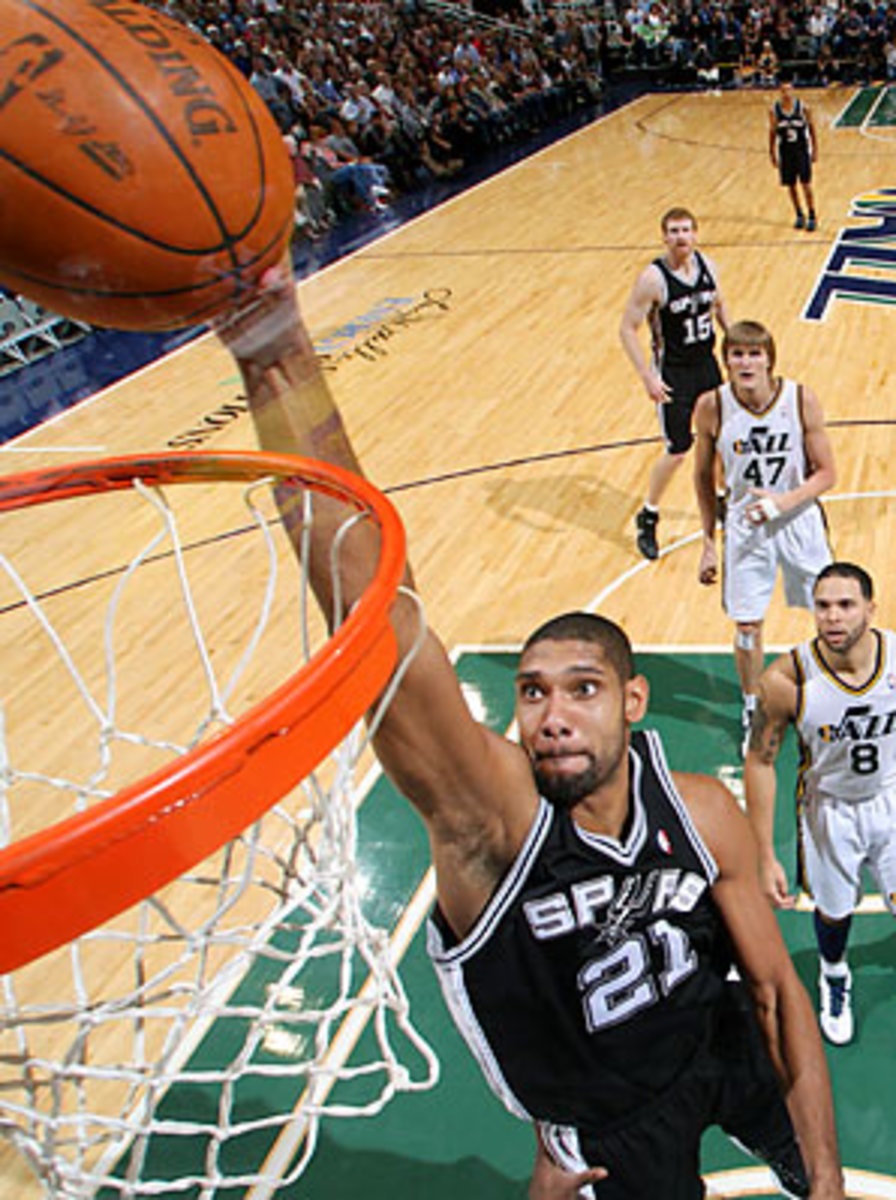For Duncan, actions speak louder
Tim Duncan's 20,791st point -- one more than David Robinson and establishing a Spurs NBA franchise record -- wasn't of the highlight reel variety. It wasn't a tomahawk flush or a fast break finish. It didn't bring the crowd to its feet or send his bench into a frenzy. No, Duncan's record-breaking points came Friday against the Utah Jazz on a pair of free throws, a decidedly dull way to break a distinguished mark.
In a way, it was vintage Duncan, a player whose career has always been more about substance than style. His nickname, The Big Fundamental, describes his game with pinpoint accuracy. The majority of Duncan's buckets over the years have come through a blend of spin moves, jump hooks and picture-perfect elbow bank shot that is referred to by coaches to players as "that Tim Duncan bank shot."
"He's very unpredictable in his predictability," said Wizards coach Flip Saunders. "What I mean is that he's very predictable in how he was going to play, but he was never predictable in how he was going to do it. He takes what is there. He never forces anything. Anything. He just lets the game come to him."
As dull as Duncan's style is, few have been able to match his effectiveness. Duncan, you see, has no weaknesses. He scores (21.1 ppg in his career), shoots a high percentage (50.8%), rebounds (11.6 per game) and defends (13 straight selections to an All-Defensive team). And he's at his best when it matters the most: Nearly all of his postseason numbers exceed his stats in the regular season. It's that consistent and complete production that has made Duncan a two-time MVP and a four-time NBA champion, three title runs that ended with Duncan as Finals MVP.
"He never strays away from his game plan," marveled Ray Allen. "He has that Karl Malone/John Stockton mystique about him. He knows his moves and when he goes to him, they are hard to stop."
Indeed, ask coaches about what they like about Duncan and often you are surprised with the answer. Some will talk about his diverse offense and his ability to take over games at either end of the floor. You know, SportsCenter stuff. But others will rave at his attention to detail and his ability to dominate facets of the game that don't jump off a stat sheet.
"Sure, he's a great low post player," said Thunder coach Scott Brooks. "But he's a ball mover, he's a screen setter. He's just an amazing, complete player."
Duncan's status among the all-time great big men is a topic of frequent debate. Is he between Hakeem and Moses? What about Shaq and Bill Walton? But it's irrelevant, really. Duncan's greatness is not in his ability to win individual battles. It's in his ability to elevate a team. San Antonio already had an established superstar in place in David Robinson when they made Duncan the top pick in the 1997 NBA draft. A ballyhooed rookie, Duncan could have made the transition difficult. Instead he (along with a magnanimous Robinson) forged a strong chemistry and powered the team to two championships before Robinson retired in 2003. The two were on the podium together after the Spurs clinched the title in '03 largely behind Duncan's staggering 21 points, 20 rebounds, ten assists and eight blocks. Duncan answered a few questions, rose, slapped Robinson on the back and allowed the longtime face of the franchise to enjoy last great moment of his playing career.
Great player. Better teammate.
As age and injury have robbed him of some of his skills, Duncan has quietly channeled Robinson. He has ceded the spotlight in San Antonio to Tony Parker and Manu Ginobili without the slightest trace of complaint and embraced the role of mentor to up-and-comers like DeJuan Blair and Tiago Splitter. Think that's easy? Ask Allen Iverson.
Soon, the Duncan Era will end. It has been speculated that if a lockout wipes out next season -- the final season of Duncan's contract -- that Duncan, 34, will walk away. If he does, he will go quietly, with little fanfare. The way only Duncan could do it.






